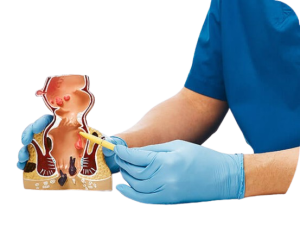Services
Fissures

Fissures are small tears or cracks in the lining of the anus, which is the opening at the end of the digestive tract where stool exits the body. While they can occur in anyone, they are more common in adults than children. Fissures can be quite painful and uncomfortable, making it difficult to pass stool.
Causes : Fissures often occur due to trauma or injury to the anal canal. Common causes include passing hard or large stools, chronic constipation, diarrhoea, or childbirth. Straining during bowel movements can also put pressure on the anus and lead to fissures.
Symptoms: The most common symptom of an anal fissure is intense pain during or after bowel movements. You may also notice bright red blood on the toilet paper or in the toilet bowl after passing stool. Some people may experience itching, burning, or a feeling of discomfort in the anal area.
Treatments
1. Lifestyle Changes: Making changes to your diet and lifestyle can help alleviate symptoms and prevent fissures from recurring. This includes increasing fiber intake, drinking plenty of water, and incorporating regular exercise into your routine to promote healthy bowel movements.
2. Topical Medications: Over-the-counter creams or ointments containing topical anesthetics or steroids can help relieve pain and inflammation associated with fissures. These medications are usually applied directly to the affected area.
3. Sitz Baths: Soaking in warm water baths, known as sitz baths, can help relax the muscles around the anus and promote healing of the fissure. This can be done several times a day for relief.
4. Prescription Medications: In some cases, your doctor may prescribe medications such as calcium channel blockers to help relax the muscles and promote healing of the fissure.
5. Surgery: If conservative treatments are not effective, surgery may be necessary to repair the fissure. This may involve a procedure called lateral internal sphincterotomy, where the muscle around the anus is partially cut to reduce pressure and allow the fissure to heal.
It’s important to consult with a healthcare professional if you experience symptoms of an anal fissure, as they can provide a proper diagnosis and recommend the most appropriate treatment plan for your individual needs. Early intervention can help prevent complications and promote faster healing.

